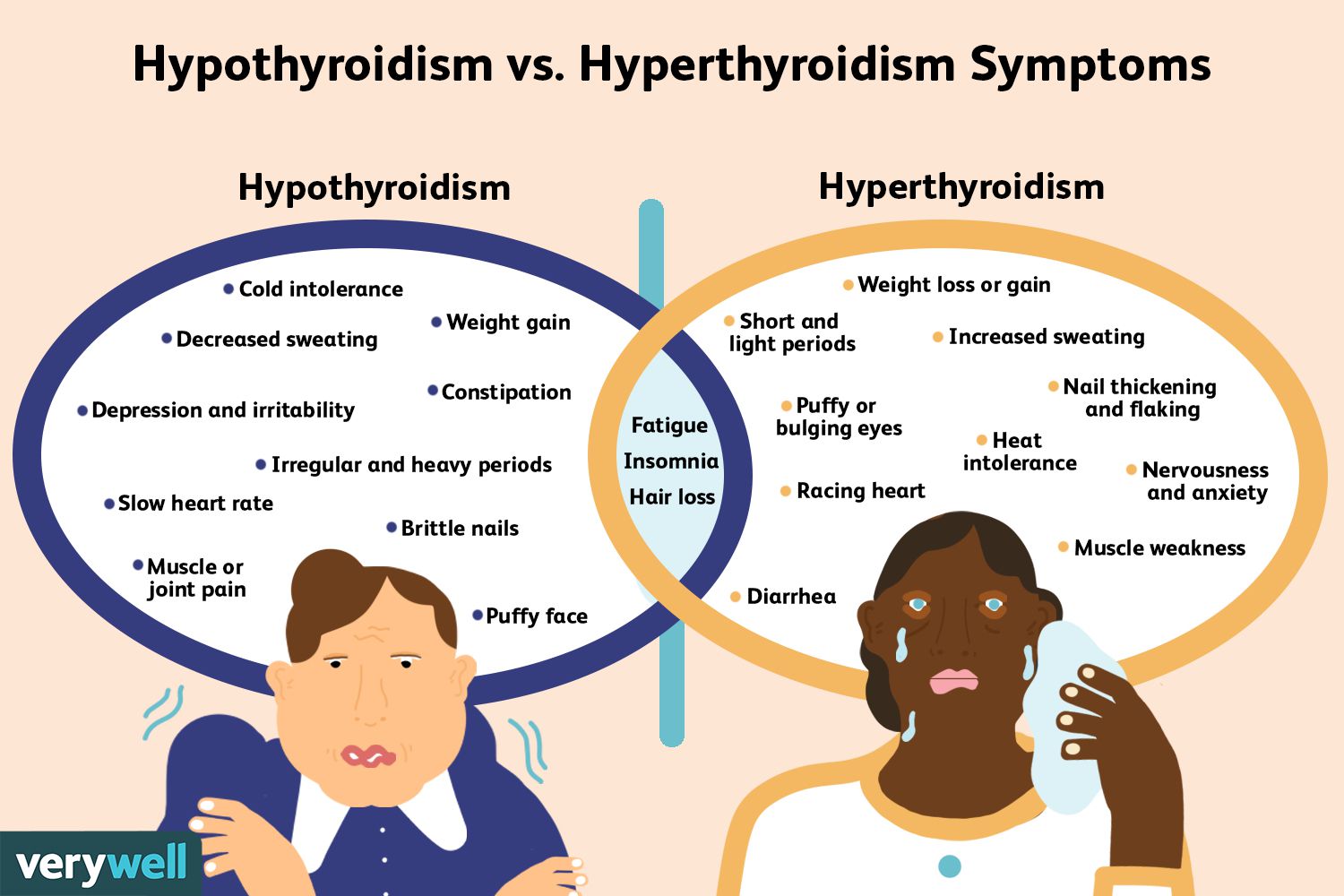Thyroid 360°: Your Guide to Detecting, Diagnosing & Defeating Disorders
Health News: The thyroid gland, located at the base of the neck, plays a vital role in regulating metabolism through the release of thyroid hormones. When the thyroid produces too little hormone, it’s called hypothyroidism (underactive thyroid), and when it produces too much, it’s called hyperthyroidism (overactive thyroid). Both conditions can affect many body systems and require medical diagnosis and management.
Thyroid hormones are important for physical and cognitive development in children. Congenital hypothyroidism means a child is born with an underactive or absent thyroid, which can cause irreversible brain damage and stunted growth if not treated quickly. Fortunately, newborn screening programs help detect this early.
In slightly older children and adolescents, thyroid issues can manifest as delayed puberty, growth retardation, weight fluctuations, and academic difficulties. Those at higher risk—especially with a family history or autoimmune disease—should be monitored regularly.
During pregnancy, the demand for thyroid hormones increases. These hormones are vital for the baby’s brain development, especially in the first trimester, when the fetus is entirely dependent on the mother. Both hypothyroidism and hyperthyroidism in pregnancy can lead to miscarriage, premature birth, low birth weight, and complications like preeclampsia. If maternal hypothyroidism is not treated, it can harm the child’s brain and motor development. Women with a personal or family history of thyroid problems, goiter, or autoimmune diseases are advised to get thyroid screening at the beginning of pregnancy.
Thyroid-related problems in adults often present subtly and may be mistaken as normal signs of aging. Symptoms like fatigue, constipation, memory issues, and depression are classic signs of hypothyroidism, yet are often ignored.
In contrast, hyperthyroidism in the elderly can present as a more silent version, known as apathetic hyperthyroidism. Symptoms include unexplained weight loss and palpitations.
Since both hyperactive and underactive thyroids can significantly affect cardiovascular health, regular screening becomes more relevant with age.
Common Thyroid Disorders
-
Hypothyroidism (Underactive Thyroid):
Most common, especially in women. Occurs due to insufficient hormone production. Often caused by Hashimoto’s thyroiditis, an autoimmune disease.
Symptoms: Fatigue, weight gain, cold intolerance, constipation, dry skin and hair, depression, menstrual irregularities, infertility.
-
Hyperthyroidism (Overactive Thyroid):
Speeds up the body’s metabolism.
Symptoms: Weight loss despite normal or increased appetite, heat intolerance, excessive sweating, tremors, diarrhea, palpitations, anxiety, restlessness, insomnia, irritability.
-
Subacute Thyroiditis:
Temporary thyroid inflammation, usually post-viral.
Symptoms: Neck pain, fever, temporary hormonal fluctuations.
-
Goiter:
Visible or palpable enlargement of the thyroid gland. Usually due to iodine deficiency or autoimmune conditions. May cause difficulty swallowing or breathing in some cases.
-
Thyroid Cancer:
Less common but increasingly diagnosed. Often detected suddenly. Most cases have good prognosis with timely surgery and follow-up.
Symptoms: Persistent neck lump, voice changes, difficulty swallowing, rapid enlargement of swelling.
Important Points
Hypothyroidism (Underactive Thyroid)
-
Causes:
-
Autoimmune disease (e.g., Hashimoto’s thyroiditis)
-
Thyroid surgery or radiation
-
Certain medications (e.g., lithium)
-
Congenital thyroid defects
-
Iodine deficiency (rare in the U.S.)
-
-
Symptoms:
-
Fatigue, weight gain, constipation
-
Cold intolerance, dry skin, depression
-
Slow heart rate, memory issues
-
Puffy face, hoarse voice
-
-
Diagnosis:
-
Blood tests: Elevated TSH, low T4
-
Sometimes T3 and antibody tests
-
-
Treatment:
-
Daily thyroid hormone replacement (levothyroxine)
-
Regular monitoring to adjust dosage
-
-
Complications if Untreated:
-
Goiter, heart disease, infertility
-
Myxedema (rare, life-threatening coma)
-
Hyperthyroidism (Overactive Thyroid)
-
Causes:
-
Graves’ disease (most common)
-
Thyroid nodules (toxic goiter)
-
Thyroiditis
-
Excess iodine intake
-
Pituitary adenoma (rare)
-
-
Symptoms:
-
Weight loss despite increased appetite
-
Rapid heartbeat, tremors, anxiety
-
Heat intolerance, insomnia
-
Diarrhea, hair loss, irregular periods
-
-
Diagnosis:
-
Blood tests: Low TSH, high T3/T4
-
Antibody tests (for Graves’)
-
Imaging: Radioactive iodine uptake scan, ultrasound
-
-
Treatment Options:
-
Antithyroid medications (e.g., methimazole, PTU)
-
Radioactive iodine therapy (may cause hypothyroidism)
-
Surgery (partial or full thyroid removal)
-
Beta-blockers for symptom relief
-
-
Complications if Untreated:
-
Atrial fibrillation, stroke
-
Osteoporosis, thyroid storm (emergency)
Tests:
-
TSH, T3, T4 (blood tests)
-
Thyroid antibody tests
-
Ultrasound if needed for diagnosis or follow-up
How to Maintain a Healthy Thyroid
-
Examine the neck area: Stand in front of a mirror, tilt your head back, and swallow. Check for any unusual swelling around the thyroid gland.
-
Do not ignore subtle signs: Unexplained fatigue, mood changes, hair thinning, or weight fluctuation may indicate hormonal imbalance.
-
Ensure adequate iodine intake: Especially important for children and women—consume iodized salt.
-
Plan pregnancy wisely: If you’re pregnant or planning to conceive, check your thyroid levels early.
-
Take your medication consistently: If diagnosed with thyroid disease, take medication at the same time every day, preferably on an empty stomach in the morning.
Common Myths vs. Reality
| Myth | Reality |
|---|---|
| Only women get thyroid disease | More common in women, but men can also be affected. |
| Weight gain always means hypothyroidism | Thyroid issues are one of many causes of weight change—proper evaluation is needed. |
| Thyroid disease lasts for life | Some thyroid issues, like subacute thyroiditis, are temporary and curable. |
| Thyroid medication makes you dependent | Thyroid hormone replacement is not addictive—it’s essential if your body can’t produce enough. |
| Normal TSH means you’re cured | It means your current medication is maintaining balance, not that the condition has resolved. |
Thyroid Disorders: Hyperthyroidism vs. Hypothyroidism
| Feature | Hyperthyroidism (Overactive Thyroid) |
Hypothyroidism (Underactive Thyroid) |
|---|---|---|
| Definition | Excess thyroid hormone production | Inadequate thyroid hormone production |
| Prevalence (U.S.) | ~1.3% of the population | More common, especially in women and older adults |
| Common Cause | Graves’ disease (autoimmune), thyroid nodules, excess iodine | Hashimoto’s thyroiditis (autoimmune), thyroid surgery, radiation |
| Hormone Levels | ↑ T3/T4, ↓ TSH | ↓ T3/T4, ↑ TSH |
| Metabolism | Speeds up metabolism | Slows down metabolism |
| Key Symptoms | – Rapid heartbeat – Weight loss – Anxiety – Heat intolerance – Tremors – Frequent bowel movements – Goiter, eye bulging |
– Fatigue – Weight gain – Cold intolerance – Dry skin – Constipation – Depression – Puffy face – Hoarse voice |
| Infant Signs | Rare but can cause irritability, poor weight gain | Feeding issues, jaundice, poor growth, hoarse cry, enlarged tongue |
| Diagnosis | Blood tests: ↓ TSH, ↑ T3/T4 RAIU scan, antibody tests |
Blood tests: ↑ TSH, ↓ T4 May include T3, thyroid antibody testing |
| Main Treatments | – Antithyroid meds (methimazole, PTU) – Radioactive iodine (RAI) – Surgery – Beta blockers (symptoms only) |
– Levothyroxine (T4 hormone replacement) – Lifelong management |
| Complications if Untreated | – Atrial fibrillation – Heart failure – Osteoporosis – Thyroid storm (emergency) |
– Goiter – Heart disease – Infertility – Myxedema coma (emergency) |
| Dietary Cautions | Avoid high-iodine foods (e.g., seaweed, iodized salt) | Ensure sufficient iodine (unless already treated) |
| Pregnancy Impact | Risk of preterm birth, complications if untreated | May cause miscarriage, preeclampsia, fetal developmental issues |
Key Differences
Feature
Hypothyroidism
Hyperthyroidism
Hormone Levels
Low T3/T4, high TSH
High T3/T4, low TSH
Metabolic Effect
Slows down metabolism
Speeds up metabolism
Weight
Gain
Loss
Energy
Fatigue, sluggishness
Restlessness, anxiety
Treatment
Hormone replacement
Hormone suppression/destruction
Long-term Risks
Heart disease, infertility
Stroke, thyroid storm
| Feature | Hypothyroidism | Hyperthyroidism |
|---|---|---|
| Hormone Levels | Low T3/T4, high TSH | High T3/T4, low TSH |
| Metabolic Effect | Slows down metabolism | Speeds up metabolism |
| Weight | Gain | Loss |
| Energy | Fatigue, sluggishness | Restlessness, anxiety |
| Treatment | Hormone replacement | Hormone suppression/destruction |
| Long-term Risks | Heart disease, infertility | Stroke, thyroid storm |
Summary
-
Hyperthyroidism = OverdriveYour body burns through energy too fast → weight loss, anxiety, rapid heartbeat.
-
Hypothyroidism = SlowdownYour metabolism drags → fatigue, weight gain, cold intolerance.
Both are manageable with proper diagnosis and consistent treatment.
The thyroid may be small, but its impact is enormous. From guiding a child’s brain development to supporting pregnancy, maintaining metabolism, and balancing mood even in old age—this small gland plays a major role. Recognizing the symptoms, getting timely treatment, and staying informed can be life-changing. Whether it’s a fatigued teenager, a worried new mother, or elderly parents feeling unusually down—take note. It might be a sign of thyroid dysfunction.









